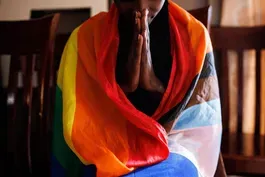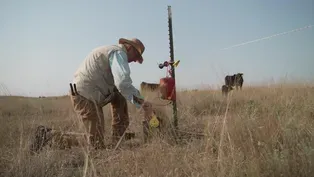
A Black physician’s memoir details medical racism in America
Clip: 1/28/2024 | 5m 58sVideo has Closed Captions
A Black physician’s memoir looks at the legacy of medical racism in America
Dr. Uché Blackstock has seen firsthand how medical racism shapes health care in America. She's dedicated her career to work at the intersection of medicine, health equity and systemic racism. Her new memoir, "Legacy: A Black Physician Reckons with Racism in Medicine," details both historic health care inequities and her own family history. She joins John Yang to discuss her work and experiences.
Problems with Closed Captions? Closed Captioning Feedback
Problems with Closed Captions? Closed Captioning Feedback
Major corporate funding for the PBS News Hour is provided by BDO, BNSF, Consumer Cellular, American Cruise Lines, and Raymond James. Funding for the PBS NewsHour Weekend is provided by...

A Black physician’s memoir details medical racism in America
Clip: 1/28/2024 | 5m 58sVideo has Closed Captions
Dr. Uché Blackstock has seen firsthand how medical racism shapes health care in America. She's dedicated her career to work at the intersection of medicine, health equity and systemic racism. Her new memoir, "Legacy: A Black Physician Reckons with Racism in Medicine," details both historic health care inequities and her own family history. She joins John Yang to discuss her work and experiences.
Problems with Closed Captions? Closed Captioning Feedback
How to Watch PBS News Hour
PBS News Hour is available to stream on pbs.org and the free PBS App, available on iPhone, Apple TV, Android TV, Android smartphones, Amazon Fire TV, Amazon Fire Tablet, Roku, Samsung Smart TV, and Vizio.
Providing Support for PBS.org
Learn Moreabout PBS online sponsorshipAmerica's health care system.
She's seen it# both as a physician and as a patient.
She's## dedicated her career to work at the intersection# of medicine, health equity and systemic racism.
She's an emergency medicine physician and is# CEO and founder of Advancing Health Equity,## an organization which works to dismantle# racism in health care.
And now Dr. Blackstock## has written a memoir entitled "Legacy:# A Black Physician Reckons with Racism## in Medicine," details both historic health# care inequities and her own family history.
Dr. Blackstock, thanks for joining us.
I love# the title Legacy because there are really two## legacies that run through this book.
I want to# start with the family legacy.
Your mother was## what was very rare in the 80s and 90s.
A black# female physician, how did watching her work## seeing her go to work every day and actually# seeing her at work?
How did that affect your## decision to become a physician?
We should# mention your twin sisters also a physician UCH# BLACKSTOCK, CEO and founder of# Advancing Health Equity: Yes obviously she wa we did.
She was born in poverty and# public assistance the first person in## her family to graduate from college and then# she went to medical school, then she came back after medical school to# practice in the community in which she grew up in.
And so that was a powerful message for us that# you know, you go, and you know, you get a great## education, you come back and bring those resources# back, and you help -- you help those that are your## family and neighbors.
And that's exactly what# she did.
And she would get together with other## black women, physicians in our community and# hold community health fairs, really to help## out the folks who lived in our neighborhood.# And I love that message that she sent to us.
JOHN YANG: Your mother died relatively young,# she was 47.
She died of leukemia.
And also## you had an experience that you detail# in the book where you had appendicitis## that was misdiagnosed and became very,# very seriously, your appendix burst.
Do you think the outcomes or the treatment might# have been different if you weren't black women?
UCH# BLACKSTOCK: I think it's very, very likely.# And it's not just because of my own anecdotal## experiences.
It's because we have we have a lot# of data that shows when black people, when women,## when black women go to seek care, often, their# concerns are ignored, dismissed or minimized.
When I had appendicitis, I was a first# year medical student.
And I went to## the ER three times, my appendix ended up# rupturing.
I had long term complications,## I have to be out of school for a month.
And# after that happened, I looked back and said,## but that had happened if I wasn't a# young black woman.
I have to think## that the fact that I was a black woman# really impacted how I was cared JO HN YANG: The first physician you saw# the emergency underestimated your pain,## so that's can't be appendicitis.# She's not in that much p UCH# BLACKSTOCK: Exactly.
And that's something# that patients are cared for.
There is something# called pain in equity, where we have seen## a trend and it's in the research that black# patients their pain is often undertreated.
And that connects to really deep rooted# systemic beliefs back from slavery days,## that somehow we are biologically different, that# we feel pain differently than other people do.
JOHN YANG: Leads me perfectly into# my next question is the two legacies## sort of come together at Harvard Medical School,## you and your sister with your mother became the# fi UCH# BLACKSTOCK: Yes.
that date back to the 19 century, or# to Jim Crow, talk about some of those?
UCH# BLACKSTOCK: Yeah, you know, and I talked# about this idea that whether explicitly or## implicitly, in medical school, where we're# taught this idea that our patients who are black are biologically different.
So for# example, there's something that is called## the race correction factor that is associated# with assessing or measuring kidney function.
And for a very long time, up until# very recently, there was a different## set of normal values for black patients and# non-black patients.
And that was ba this myth, this idea that black# people had higher muscle mass,## which somehow translated into a different# set of normal values for kidney But anyway, what that has led to is black# people being deferred to or to having delayed## specialty care for their kidneys are not placed# on transplant list.
So these ideas that are deeply## rooted that we are taught in school actually end# up having a detrimental impact on our patients.
JOHN YANG: And it's also -- the# sort of institutional racism or## systemic racism also has that effect# on the number of black UCH# BLACKSTOCK: Yes.
Yes.
And so I write# about in the book, the Flexner Report,## which came out in 1910, that was actually# commissioned by Association and Carnegie Mellon Foundation, they# sent an educational specialist, Abraham to assess all of the medical schools in the# U.S. and Canada, and to hold them against## the standards of Western European medical# schools are in the U.S., Johns Hopkins.
And that led to the closure of five out of# seven of the historically black colleges and## universities that up to that point had trained# about 1,600 students.
But it's esti five medical schools at the turn of the century,# those black medical schools had stayed open,## they would have trained between# 25,000 and 35,000 black physicians.
That is such a tremendous loss not only# in the workforce, but the patients they## could have treated the students they could have# mentored the research that could have been done.
JOHN YANG: Back to the title# Legacy, we see your mother's## legacy in your work your sisters work,# wh UCH# BLACKSTOCK: My legacy I would love to# be able to, especially with this book to## help connect the dots for people in# terms of how did we arrive in 2024,## to the place where we have these very# horrific racial health inequities?## How can people do better and I have a# call to action at the end of the book,## how different groups of people even in their# personal lives can help addres JOHN YANG: Dr. Uché Blackstock,# the book is "Legacy: A Black## Physician Reckons with Racism in# Medicine."
Thank you v UCH# BLACKSTOCK: Thank you for having me.
LGBTQ Ugandans fight to survive under country’s anti-gay law
Video has Closed Captions
Clip: 1/28/2024 | 8m 36s | LGBTQ+ Ugandans fight for survival, civil rights under country’s anti-gay law (8m 36s)
Montanans band together to save an iconic American landscape
Video has Closed Captions
Clip: 1/28/2024 | 5m 9s | How Montanans are banding together to preserve an iconic American landscape (5m 9s)
Providing Support for PBS.org
Learn Moreabout PBS online sponsorshipSupport for PBS provided by:
Major corporate funding for the PBS News Hour is provided by BDO, BNSF, Consumer Cellular, American Cruise Lines, and Raymond James. Funding for the PBS NewsHour Weekend is provided by...













